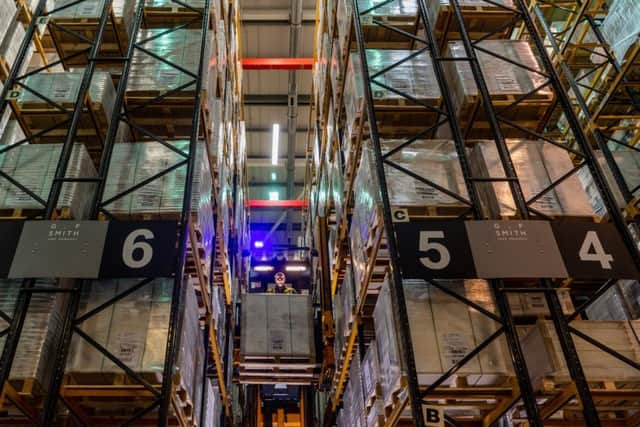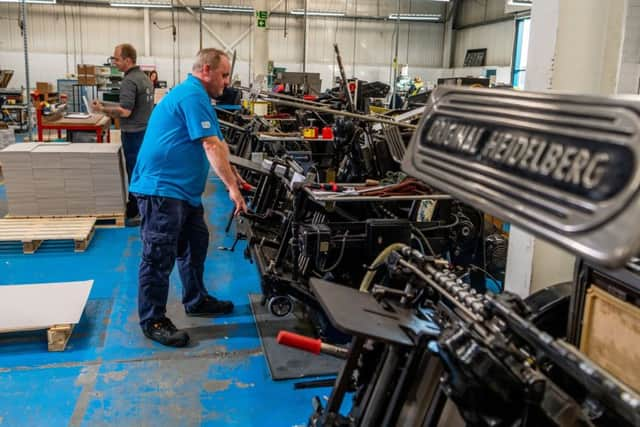The Hull-based paper making firm going strong in the digital age
It was on this night that both of G F Smith’s factories were hit by incendiary bombs rained down by the Luftwaffe in Hull – and in London.
Nearly 300 people in Hull were either killed or seriously injured that evening, but miraculously there were no casualties at the works.
Advertisement
Hide AdAdvertisement
Hide AdIt could have been the end of the road for the business, but G F Smith was made of stronger stuff.


A few days later, the firm sent a short, stoic letter to all its customers (and its bankers, the National Provincial), assuring them that they had stocks at their mills, and that with “support and co-operation”, it would be (they hoped) “business as usual.”
They were the epitome of the “wartime spirit” in Yorkshire and they rose, Phoenix-like, from the rubble. Just like Hull’s renowned department store, Hammonds, which had also been flattened, G F Smith regrouped and sections of the business were soon up and running again. Not, perhaps, all on the same site, but with the determination of the day and the loyalty of staff their works were humming again, albeit in different locations.
Advertisement
Hide AdAdvertisement
Hide AdThere is a remarkable picture, taken only hours after the raid, of one of their machines buried under several tonnes of rubble, “peeking out” defiantly. The venerable press was hauled out of the masonry and soon restored to full working order. It is still in use today, a remarkable testament to its makers and the firm that owns it.


“It does its job”, says commercial director Glynn Houghton. He started on the shop floor, straight from school at 16, as a trainee office boy. Now 56, he’s served more than a few decades with the firm.
The machine in question is now in the envelope-making department of the company, and tended, very proudly, by Glenn Robinson, who, at only 49, has already clocked up 32 years with the firm. He, too, started at 16 and has no intention of moving on. Glenn is not alone. There are dozens of the Smith workforce who started as teenagers, love their work and the firm and are fiercely loyal.
If Glenn ever decided to enter Mastermind choosing ‘envelopes’ as his specialist subject, it would probably be wise to stop the quiz before it even started, because the man is an expert. He’d win hands-down. Did you know that Russian envelopes, for example, are of a different size and shape to our “normal ones”, and that they require different packaging entirely? No, me neither.


Advertisement
Hide AdAdvertisement
Hide AdAnd if you think that something as commonplace as an envelope is a simple cut and fold job, then think again. Unpick one and you’ll find that it isn’t just a square-on fold and stick, but quite a complicated shape before the machine deftly constructs the finished article. There are run-of-the-mill envelopes, bespoke ones and envelopes created with a special purpose. The range and the size and the colour is bewildering. And that is, in essence, what G F Smith is all about – creating wonderful paper-based products in an increasingly digital world.
Exploring the company’s history is fascinating. It all goes back to 1885, when George Frederick Smith, who had spent his life as a working commercial traveller, sold paper and stationery to publishers and printers. He then persuaded his eldest son, Thomas Brooks Smith, to set up G F Smith to source, supply and sell paper. Which is still broadly what the business does today.
There was a pivotal moment in those early days when George and Thomas began sourcing specialised papers from mills not only in the UK, but across Europe and the US.
At the end of the Victorian age, Thomas Brooks Smith found himself on a steamer bound for North America, to have business discussions about paper sourcing from the Strathmore Paper Mill. The mill’s founder, Horace Moses, was less than enthusiastic about having a meeting, even if Thomas had come quite a distance. Showing what we might call ‘Yorkshire grit’, Thomas put on his top hat and went up to the Moses house for a face-to-face chat. Horace was (apparently) not amused by this unannounced whippersnapper, standing on his doorstep on a Saturday afternoon.
Advertisement
Hide AdAdvertisement
Hide AdBut fate intervened. For Mrs Moses also returned home, in a flummox. She revealed that the organist engaged to play at a church concert that day had been taken ill. Thomas rolled back his cuffs, and demonstrated his skill on the keys. Mr and Mrs Moses were so impressed that they immediately sent for his luggage from his hotel, and he became their house-guest for the duration of his stay. Better yet, G F Smith and Strathmore became long and lasting partners, and Smith was awarded the lucrative contract for the US business throughout Britain and mainland Europe. It didn’t stop there, for Thomas also snapped up another deal with the Rising Paper Company – for blotting paper.
Smith was a pioneer in all sorts of fields and ventures. One department in Hull today – the firm is now based in Lockwood Street, a few minutes’ stroll from the city centre – is so skilled that you can pick a paper at random from the stocks and, with eyes closed, they can tell you the type and quality of the embossing. This embossing isn’t vanity but a protection against counterfeiting.
Ironically, considering what the Hull Blitz did to Smith’s original factory, when it finally found new Lockwood premises in 1947 (which cost all of £5,000), the firm discovered that they had been used for many years as a munitions factory, and that the company had inherited a “mountain” of beautiful old wooden rifle butts. Long-before recycling became the fashion, G F Smith decided to ask their contractors to shape the wood into parquet flooring, and it remains in place today.
Over the years the premises expanded and one of the warehouses is higher than your average aircraft hangar, and the staff who work in specialised cherry-pickers have to be properly trained in abseiling, in case anything goes wrong.
Advertisement
Hide AdAdvertisement
Hide AdGlyn Houghton sets G F Smith a tough target “to be the world’s most respected and remarkable fine paper company,” but says they have people to meet the challenge. There’s a workforce of about 210, and the factory is humming from six in the morning until 10 at night. It supports young designers and British paper mills.
“There is no doubt that paper is in danger,” says Glyn, “and we are becoming a niche market, but as the age becomes more and more digital, people are reacting, and wanting more and more tactility”. G F Smith are moving now into digital wedding albums, and are exploring links and ideas with photographers – keeping memories alive on paper, but with innovation.
And then, in a perfectly tidy corner of the plant, in amongst stacks of fine writing papers and envelopes is Kat Jackson (daughter of the famed local artist Tony Bell), who the company turns to when they want powerful, multi-coloured presentations in paper.
Advertisement
Hide AdAdvertisement
Hide AdKat (“I’m new, I’ve only been here twelve years”) is their Paper Smith, their origami expert, crafter and quiller (quills are tiny shards of tightly rolled paper) extraordinaire. The Paper Smith concept allows people to get smaller amounts of the firm’s paper, such as start-up businesses and individuals in the craft industry.
Kat studied graphic design at college and helped run a print shop in Hull before arriving at G F Smith. “If I see something, I can remake it in paper,” she says.
More than a 130 years after it started out, here is a warm, inventive Yorkshire family firm at the top of its game. You suspect founding father George Frederick would be proud of them.